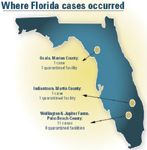Equine herpes kills 7 horses in 2 states
National Report - A horse imported from Germany and treated for fever at a USDA facility has been connected to an outbreak of Equine Herpes Virus – type 1 (EHV-1) affecting 14 horses, half of which have died.
NATIONAL REPORT — A horse imported from Germany and treated for fever at a USDA facility has been connected to an outbreak of Equine Herpes Virus – type 1 (EHV-1) affecting 14 horses, half of which have died.
Quarantined and treated in the USDA New York Import Center for three days in November, the horse cannot be confirmed as the EHV-1 source because the Animal and Plant Health Inspection Services doesn't test for that disease, says United States Department of Agriculture spokesman Jim Rogers.
"Our general concern lies with foreign disease, so the horses are not tested for equine herpes. If a horse shows any sort of clinical signs, neurological signs or fever, the horse will receive treatment and not be released until repaired," Rogers says.
The imported horse arrived with 14 others from Germany. After their release from quarantine in various facilities, they were dispersed around the country. Five were shipped to Florida locations, says Liz Compton, Florida Department of Agriculture public-information director.
Florida now has seen 13 confirmed cases of EHV-1, 10 in Wellington and one each in Indiantown, Jupiter Farms and Ocala. Of those cases, six horses have died and 10 stables were put under quarantine.

Where Florida cases occurred
The quarantine later was lifted from all 10 stables, with no additional signs of disease. One other Florida facility is being monitored because of an indirect link to the New York horses, but so far there is no sign of disease, Compton says.
Despite the quarantine, the state's agriculture department is not regulating horse racing. "We are sticking with the science. We are monitoring the situation and responding to the disease. We are not saying who should or shouldn't have a show," Compton says.
Florida officials continue to report details of the outbreak to the USDA, which is helping track the disease nationwide.
California also reported the death of one horse connected to the German imports. It arrived at the Del Mar horse-racing facility in early December from New York and began showing neurological signs of EHV-1. Unable to stand, it was euthanized, says Steve Lyle, director of public affairs for the California Department of Food and Agriculture.
The airborne EHV-1 has multiple strains that may cause respiratory and neurological disease in horses and abortion in mares, but is not harmful to humans.
Initial signs of infection include high fever, weakness and coordination problems. Compton likened the equine disease to humans getting the flu. "It depends on the horse, depends on whether they have any other health problems. Some have stronger immune systems than others," Compton said. "Obviously, the earlier you treat a horse and reduce the symptoms, the better off the horse."
Although confirmed cases have slowed, Compton says "we don't want to say one way or the other that it is contained. Factually, we are not seeing a slew of new cases. The cases we have seen are on properties that were quarantined after they had been infected. The measures everyone is taking are a testament to the fact that we are not seeing big numbers. They are remaining static and, knock on wood, we are hoping to continue that."
At least three additional outbreaks, all unrelated to the New York imports, have been reported throughout the country. Golden Gate Fields, Bay Meadows and Pleasanton race tracks in California all went under voluntary quarantine last month after a horse was confirmed to have EHV-1, according to Rick Arthur, equine medical director for the California Horse Racing Board.
The facilities lifted the quarantine in mid-January after no additional cases arose, but another track, Los Alamitos, since reported three horses diagnosed with EHV-1.
"Horsemen are encouraged to continue prudent hygiene practices and to check the temperature on all horses twice a day," Arthur says.
The University of Connecticut and the Connecticut Department of Agriculture quarantined UConn's 72-horse herd in January after at least three showed signs of EHV-1. The quarantine will remain in effect for at least three weeks after the start of the last case.
New Hampshire, Massachusetts, North and South Carolina, Pennsylvania and Kentucky also received horses that were in contact with the horse at the USDA center, but no signs of EHV-1 have been reported in those states.
Compton says she is uncertain how to categorize the outbreak. "It is so subjective. If your horse died, it is a big outbreak. If you are impacted, it is big. Regardless of the size, ... we take it seriously."